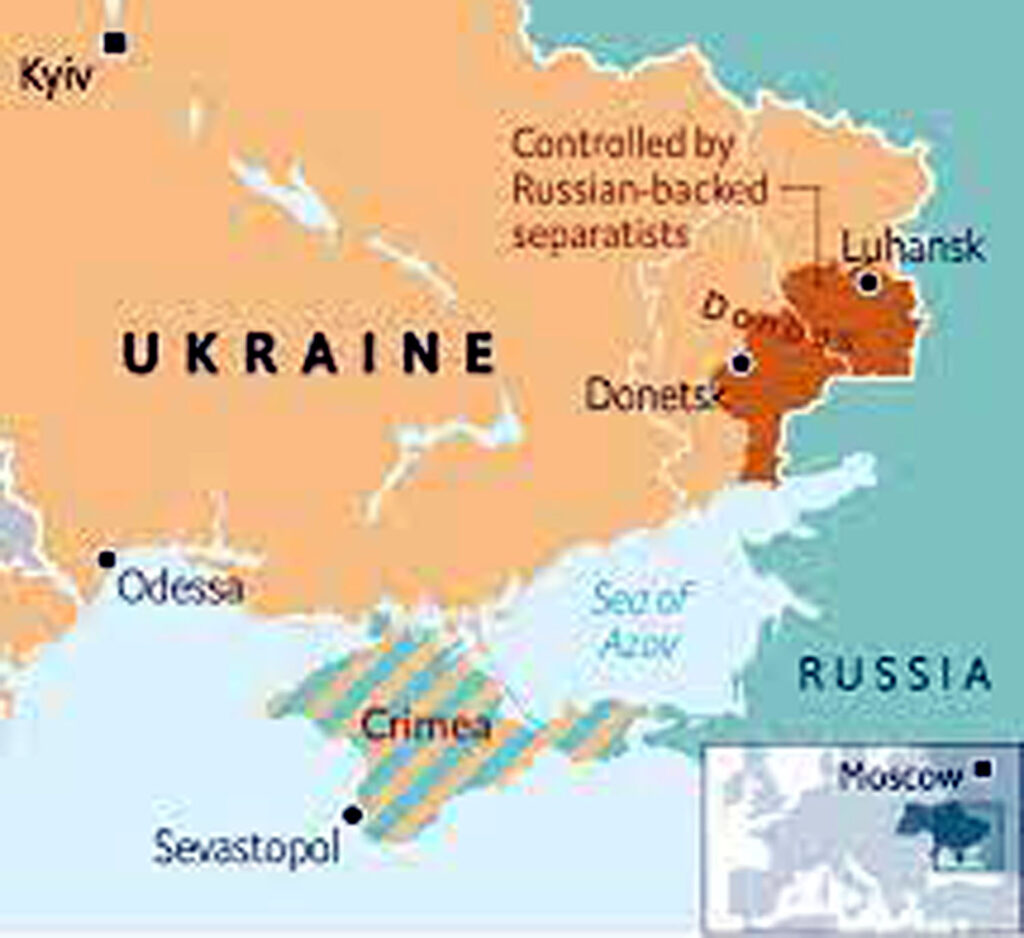Ukraine activated its military reserve and advised its nationals to evacuate Russian territory on Wednesday, as Moscow stepped up its demands, raising concerns of all-out conflict.
President Vladimir Putin of the Kremlin has put his forces on alert to capture two rebel-held districts in eastern Ukraine, despite an avalanche of international sanctions.
President Volodymyr Zelensky of Kyiv has responded by notifying Ukraine’s more than 200,000 reservists that they would be summoned to return to their regiments.
On Wednesday, Ukraine’s security council called for a state of emergency in the country, a move that must yet be legally ratified by parliament.
Meanwhile, despite tremendous international pressure on Moscow, Ukraine asked its nearly three million residents residing in Russia to leave.
New economic sanctions have been added to the mix.
According to Western capitals, Russia is said to have assembled 150,000 troops in combat formations on Ukraine’s borders with Russia, Belarus, and Russian-occupied Crimea, as well as aboard warships in the Black Sea, according to Russian sources.
Ukraine has roughly 200,000 military troops, and up to 250,000 reservists between the ages of 18 and 60 might be called up on Wednesday.
Moscow’s overall troops are substantially larger, with approximately a million active duty men, and have recently been modernised and re-armed.
High war costs: However, NATO nations have provided Ukraine with modern anti-tank weaponry and drones. More has been offered as the allies strive to discourage or at least make a Russian assault expensive.
Shelling between Ukrainian soldiers and rebels supported by Russia has increased, causing concern among residents living near the battle lines.
Dmitry Maksimenko, a 27-year-old coal miner from government-controlled Krasnogorivka, told AFP that he was taken aback when his wife informed him that Putin had recognised two rebel enclaves sponsored by Russia.
“‘Have you heard the news?’ she inquired. I had no way of knowing. There is no power, let alone the internet. “I don’t know what will happen next,” he continued, “but to be honest, I’m terrified.”
Russia’s army is set to strike Ukraine, triggering Europe’s most serious conflict in decades, according to the United States and the United Kingdom, but Putin maintains he is open to diplomacy within limitations.
Russia has demanded that Ukraine be barred from ever joining NATO and is attempting to reverse the Cold War-era spread of Western dominance in eastern Europe.
In a video speech marking the official holiday Defender of the Fatherland Day, Putin said, “The interests of Russia, the security of our population, are non-negotiable for us.”
The Federation Council, Russia’s upper parliament, unanimously approved his deployment of soldiers to two separatist Ukrainian areas now recognised as independent by Moscow, Donetsk and Lugansk, on Tuesday.
Russia said it has established diplomatic ties with the separatist statelets “at the level of embassies” after they broke away from Kyiv in 2014 in a battle that claimed over 14,000 lives.
Early Wednesday, Japan and Australia followed suit, imposing stiff fines on Moscow and people linked to the assault on Ukraine.
Biden outlined the “first tranche” of penalties, which include attempts to deprive Russia of funding and target financial institutions and “elites” in the nation.
He did, however, leave the possibility of a last-ditch diplomatic attempt to stop a full-scale Russian invasion open.
“There’s no doubt that Russia is the aggressor,” Trump said. “We’re clear-eyed about the issues we’re up against.”
Following Putin’s recognition of the self-declared separatist territories of Donetsk and Lugansk this week, Britain and the European Union imposed a slew of sanctions.
Germany also declared that it will delay certification of Russia’s Nord Stream 2 gas pipeline.
‘An invasion on a grand scale’
The sanctions have been met with disdain by Kremlin officials, who point out that energy-rich Russia has $639 billion in reserves and a $182 billion national wealth fund to take it through a crisis.
Putin’s objectives are unknown, but Western officials have been warning for weeks that he is planning an all-out invasion of Ukraine, which may start an all-out European war.
A meeting with Russian Foreign Minister Sergei Lavrov set for Thursday was cancelled, indicating that the White House no longer believes Russia is serious about averting conflict.
Putin told reporters on Tuesday that Russia has recognised the independence of Ukraine’s separatist regions within their administrative borders, including areas currently under Kiev’s authority, heightening the prospect of a confrontation.
He went on to say that there were no longer any Western-brokered peace accords on Ukraine’s crisis, and that the deployment of Russian forces would be “dependent on the exact conditions… on the ground.”
According to NATO Secretary-General Jens Stoltenberg, Moscow “continues to plot for a full-scale invasion of Ukraine.”
Putin’s “plan for a full-scale invasion of Ukraine,” British foreign minister Liz Truss told Sky News, is “likely” to be carried out.

